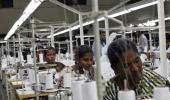 With rupee at its life-time low, Finance Minister P Chidambaram said decisions taken at home to counter impact of 2008 economic meltdown were among the reasons for depreciation of the Indian currency. He said during Question Hour in Rajya Sabha that the rupee has overshot its true value but expressed confidence that it will find its appropriate level.
With rupee at its life-time low, Finance Minister P Chidambaram said decisions taken at home to counter impact of 2008 economic meltdown were among the reasons for depreciation of the Indian currency. He said during Question Hour in Rajya Sabha that the rupee has overshot its true value but expressed confidence that it will find its appropriate level.
"There are not just external factors, there are also domestic factors. We recognise that there are domestic factors. One of the domestic factors is that we allowed the fiscal deficit to be breached and we allowed current account deficit to swell because of certain decisions that we took during the period 2009 to 2011," he said.
This was the period when government announced stimulus to ward off impact of collapse of western economies.
"It brought us growth, it stabilised the economy, we swayed off the very serious consequences of the 2008 collapse of the US economy. But it cost us in terms of fiscal deficit and current account deficit," Chidambaram said.
The government, he said, had steps to check fiscal deficit and is now on path of fiscal consolidation. The finance minister said the exchange rate was remarkably stable between August 2012 and May 2013 but rupee has come under pressure since May 22.
"All the currencies of all the emerging economies have come under pressure. For the moment we believe that the value of the rupee has overshot its true value," he said, refusing to speculate on the way rupee will move in near future.
"We have to be patient, we have to be firm, we have to be clear headed... in order to strengthen the fundamentals of the economy," he said. "I am confident that the rupee will find its true appropriate level."
Noting that high inflation and current account deficit was a cause of concern for investors, Chidambaram said the government has the conviction to contain fiscal deficit but needs to communicate its policies on CAD and inflation more effectively.
He said steps are being taken to unblock stalled projects both in infrastructure sector and manufacturing. "Once the investment cycle picks up, manufacturing picks up, I am sure it will have positive impact on the economy and in particular the current account deficit," he said.
On challenges facing the economy, he said, inflation, sluggish export growth in first three months and gold imports posed challenge.



.jpg)





